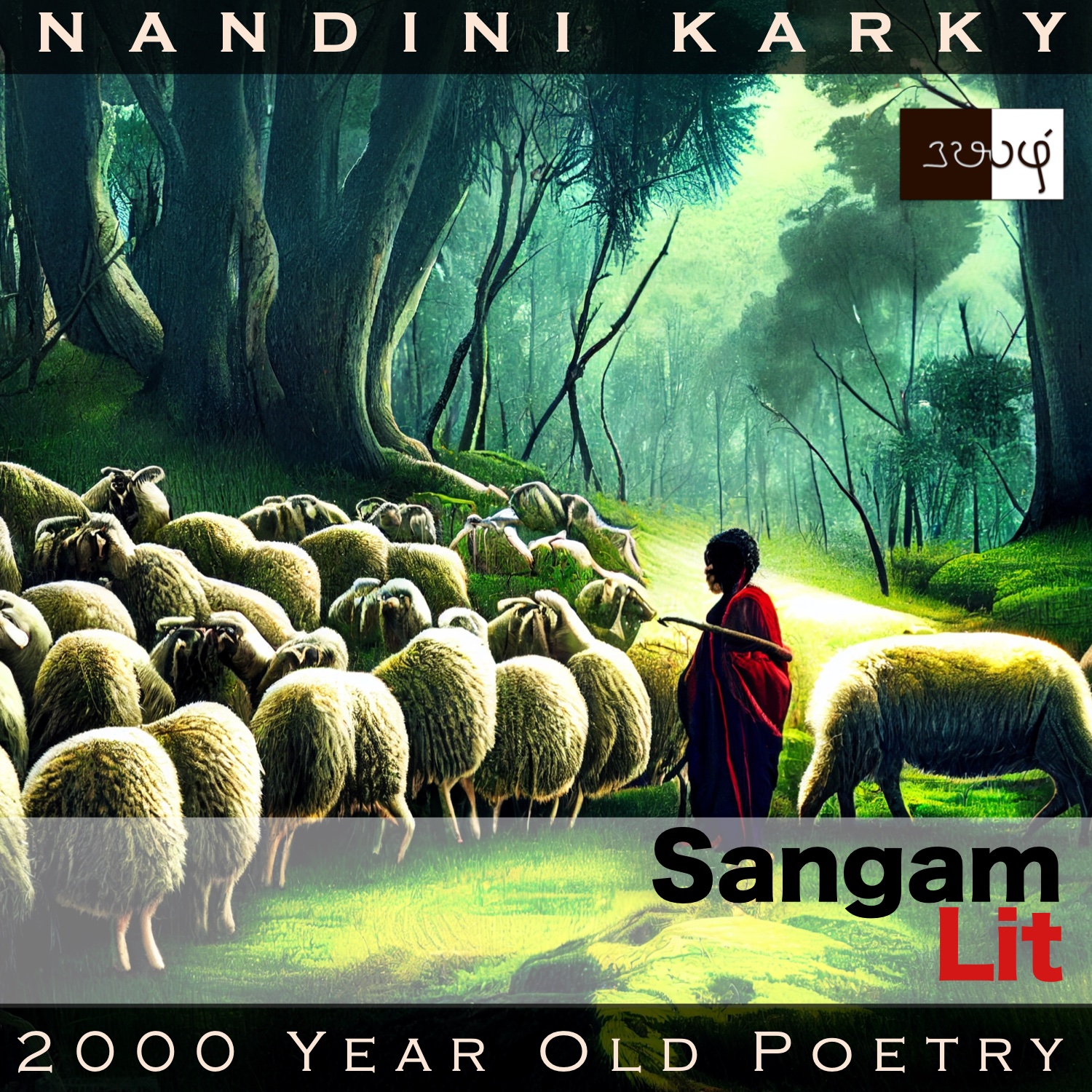Podcast: Play in new window | Download
Subscribe: Apple Podcasts | Spotify | Amazon Music | Android | iHeartRadio | TuneIn | RSS | More
In this episode, we perceive the contrasting perspectives that a ruler presents, as portrayed in Sangam Literary work, Puranaanooru 54, penned about the Chera King Kuttuvan Kothai by the poet Konaattu Erichaloor Maadalan Madurai Kumaranaar. The verse is situated in the category of ‘Vaagai Thinai’ or ‘King’s victory’ and talks about the compassion and strength of this Chera king.

எம் கோன் இருந்த கம்பலை மூதூர்,
உடையோர் போல இடையின்று குறுகி,
செம்மல் நாள் அவை அண்ணாந்து புகுதல்
எம் அன வாழ்க்கை இரவலர்க்கு எளிதே;
இரவலர்க்கு எண்மை அல்லது புரவு எதிர்ந்து,
வானம் நாண, வரையாது, சென்றோர்க்கு
ஆனாது ஈயும் கவி கை வண்மைக்
கடு மான் கோதை துப்பு எதிர்ந்து எழுந்த
நெடுமொழி மன்னர் நினைக்கும் காலை,
பாசிலைத் தொடுத்த உவலைக் கண்ணி,
மாசு உண் உடுக்கை, மடி வாய் இடையன்
சிறு தலை ஆயமொடு குறுகல்செல்லாப்
புலி துஞ்சு வியன் புலத்தற்றே
வலி துஞ்சு தடக் கை அவனுடை நாடே.
Another Chera king comes to the spotlight in this verse. The poet’s words can be translated as follows:
“In the uproarious, ancient town, where my ruler resides, as if the town entire belonged to us, seeing no time or place, supplicants like me would find it easy to approach and walk with heads held high in the respected king’s day court.
Not only being easily accessible to bards like me but also to protect us, putting rain clouds to shame, he showers wealth unceasingly, Kothai of gentle, generous hands and powerful, speeding horses. When thinking about the kings, who take tall oaths and rise against Kothai, I’m reminded of a scene in the forests, where a goatherd, who wears a garland stitched together with green leaves, and clothes that are streaked with stains, with a whistle on his pursed lips, as he walks along with his small-headed flock of goats and fears to go near the wide lands where the tiger sleeps. Such is the land of the one, with huge hands, where strength resides!”
Let’s delve deeper into these words! The poet begins by describing the capital of this king, calling it, an ancient town, filled with its characteristic hustle and bustle. Now, the poet paints a portrait of how bards and supplicants like him walk in that town. He says the stride seems to say that the town belongs to them and they walk with an upright stance without any hesitation to the court of this king. And the king too, seeing them, understands their needs and showers all that they seek, without a pause, so much so that even the rain clouds above hang their heads in shame. Such is the generosity of king Kothai, the one who possesses powerful horses, the poet adds.
Now, the poet turns to think about the state of kings, who rise against this ruler, and to etch it in vivid detail, he sketches a goatherd, one who wears not a garland of flowers but one of leaves and whose clothes are understandably stained in the mud of the forests. He seems to have perpetually pursed lips so that he can whistle to his flock of small-headed goats in a moment’s notice. From the outer appearance of this honest worker, the poet turns to his state of mind, as the goatherd looks with much fear at the region of the forest, where the tiger sleeps, and avoids approaching it. And that is the exact state of those enemy kings, who swear oaths against this Chera king, for strength is at rest in this land of the benevolent monarch, the poet concludes.
The thought that came to me when reading this verse is how a person can appear in totally different ways depending on who the person happens to be interacting with. To expand that further, though shades of another’s character can be seen, it must be clearly understood that it’s not an absolute version of someone, but rather the version presented at that moment. For instance, a person can be seen as a tough boss by their juniors but it’s quite possible that at home, they are seen as a gentle parent by their children. All this to say that we should embrace the truth that it is only human to have many different shades in us and in those around us!




Share your thoughts...